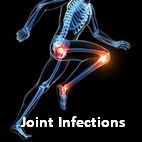16S rDNA PCR and Sequencing Diagnosis of Bone and Joint Infections
|
|
| 09 September 2019 | |
|
Orthopaedic samples constitute an important specimen type in routine laboratories. Among 1,582 samples collected in the course of four studies, incidences of joint and bone samples accounted for 27.1 to 80%. In his application note, Lustig [1] compiles the results of culture-independent molecular analysis of samples from patients under suspect of having bone or joint infections. In the studies, samples were processed by Molzym’s CE IVD kits for the detection and identification of bacteria by 16S rRNA gene PCR and sequencing analysis. The protocol is adapted to processing a variety of specimens, including tissue biopsies, implanted materials, sonicate fluids, swabs and aspirates. In clinical and other studies, more than 1,300 microorganisms have been identified by Molzym’s broad-range PCR and sequencing approach so far (Diese E-Mail-Adresse ist vor Spambots geschützt! Zur Anzeige muss JavaScript eingeschaltet sein!). Among three studies, including 482 patients in total, the diagnostic sensitivity of the Molzym tests, SepsiTest™-UMD and semi-automated UMD-SelectNA™, respectively, against culture was 89 to 100%. A high proportion (13 to 29%) of samples were PCR-positive, but culture-negative. One study judged the PCR-positive and sequencing results (26%) of added value in 20% of samples. Usual pathogens of orthopaedic infections, including staphylococci and streptococci, as well as rare pathogens were identified, including Granulicatella adiacens, Finegoldia magna, Tropheryma whipplei and Parvimonas micra. In summary, the molecular tests were regarded beneficial by their contribution to patient management in cases where cultures are negative. |
|
| Reference | |
| [1] Lustig M (2019) Application note: Culture-independent broad-range 16S rDNA PCR and sequencing diagnosis of bone and joint infections. Trends in Molecular Diagnostics No. 2/2019, 1-2. (link) | |

